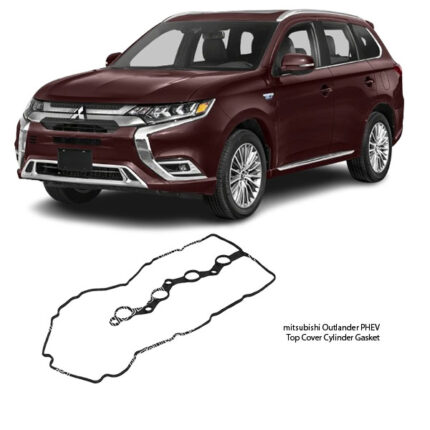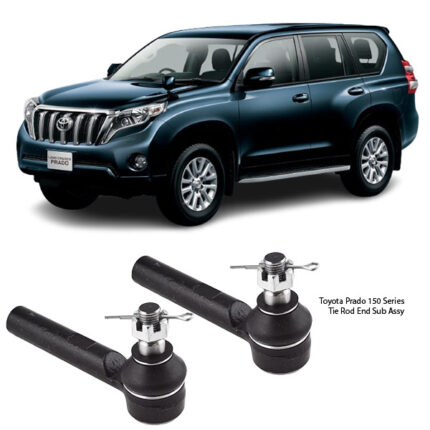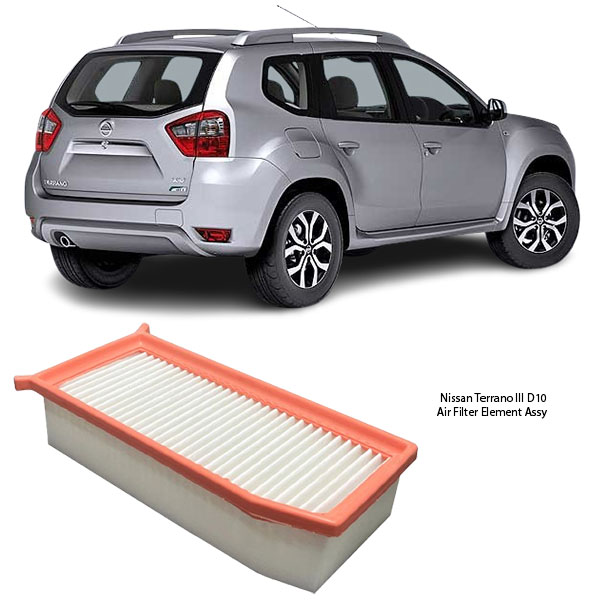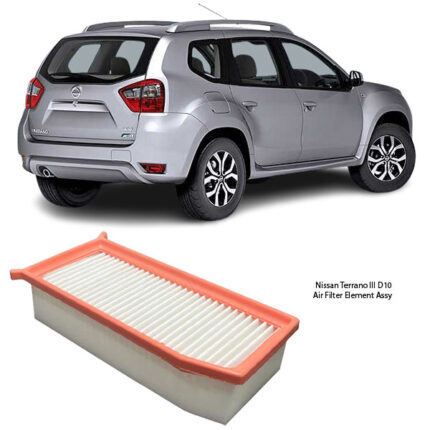Get Nissan Terrano III D10 Air Filter Element Assy AO614 in Kenya
The Air Filter Element Assembly is a vital component in a vehicle’s intake system. It serves a simple yet essential purpose—filtering the air that enters the engine. This filtered air supports efficient combustion, prevents internal damage, and ensures optimal engine performance.
While often overlooked in routine maintenance, the air filter is the first line of defense against airborne contaminants like dust, dirt, pollen, and debris. By preventing these particles from entering the engine, the air filter element helps maintain fuel efficiency, protect engine components, and reduce emissions.
What is an Air Filter Element Assembly?
The Air Filter Element Assembly consists of a filter media housed within a frame or enclosure. It is strategically located in the air intake path, usually inside the air filter box (or air cleaner housing), where it cleans the air before it enters the engine’s combustion chamber.
The filter media is typically made of pleated paper, foam, or cotton gauze, designed to maximize surface area while maintaining adequate airflow. High-quality air filters can trap particles as small as a few microns without restricting airflow, allowing the engine to breathe easily while remaining protected.
Functions of the Air Filter Element Assembly
1. Filtration of Contaminants
The primary function is to remove harmful particles from the incoming air stream. Dirt, sand, leaves, and pollutants can damage internal engine components if not properly filtered out.
2. Engine Protection
Clean air prevents abrasive particles from reaching the cylinder walls, pistons, and valves. This reduces wear and prolongs the lifespan of the engine.
3. Fuel Efficiency Support
A clean air filter promotes a balanced air-to-fuel ratio, which is critical for optimal combustion. This balance helps maintain good fuel economy and engine responsiveness.
4. Emission Control
Efficient combustion supported by clean air reduces the emission of unburned hydrocarbons, carbon monoxide, and nitrogen oxides. This contributes to compliance with environmental regulations.
5. Performance Enhancement
Engines require a consistent supply of air for peak performance. A clean filter ensures unrestricted airflow, supporting smooth acceleration and engine power.
Importance of Using a High-Quality Air Filter Element
Air is just as essential as fuel in the combustion process. Any compromise in air quality or flow can negatively affect the engine’s operation. A high-quality, genuine air filter element ensures:
-
Precise Fit and Seal: Eliminates the risk of unfiltered air bypassing the filter and entering the engine.
-
Durable Construction: Withstands extreme temperatures and vibration without collapsing or tearing.
-
Effective Filtration Efficiency: Traps the majority of harmful particles without restricting airflow.
-
Consistent Performance: Maintains filtration quality throughout its service life.
Poor-quality or counterfeit filters can deform under pressure, allowing contaminants to pass through, resulting in reduced performance and potential engine damage.
Consequences of a Dirty or Clogged Air Filter
Over time, the air filter element becomes clogged with accumulated debris. A saturated filter restricts airflow, affecting the air-fuel mixture and engine efficiency.
1. Reduced Engine Power
Inadequate airflow causes the engine to run rich (too much fuel, not enough air), leading to sluggish acceleration and poor throttle response.
2. Increased Fuel Consumption
Restricted airflow forces the engine to burn more fuel to compensate for the lack of oxygen, lowering fuel efficiency.
3. Engine Misfires or Rough Idling
A clogged filter can disrupt the combustion process, resulting in unstable engine operation, vibrations, or misfires.
4. Unusual Engine Sounds
Whistling, coughing, or popping noises from the intake system may indicate air starvation due to a blocked filter.
5. Dark Exhaust Smoke
Incomplete combustion from a rich mixture often leads to black smoke from the tailpipe, indicating unburned fuel.
6. Check Engine Light
Modern vehicles equipped with mass airflow sensors may detect airflow problems and trigger diagnostic warning lights.
Signs It’s Time to Replace the Air Filter Element
Knowing when to replace your air filter can prevent long-term engine damage and restore performance.
-
Visual Inspection: A dark, dirty, or clogged filter is an obvious sign it needs replacement.
-
Mileage-Based Replacement: Refer to the owner’s manual for recommended intervals—typically every 15,000 to 30,000 kilometers depending on conditions.
-
Performance Drop: If you notice poor acceleration, sluggishness, or increased fuel usage, the filter may be the culprit.
-
Frequent Driving in Dusty Conditions: Off-road driving, construction zones, or dry climates require more frequent filter changes.
Types of Air Filter Media
Different air filter designs offer varying degrees of filtration and airflow characteristics:
1. Paper (Cellulose) Filters
-
Most common in OEM applications
-
Excellent filtration efficiency
-
Affordable but disposable
2. Foam Filters
-
Used in off-road or dusty environments
-
Washable and reusable
-
Good dust-holding capacity but may have lower airflow
3. Cotton Gauze Filters
-
High-performance option
-
Often oiled for better dust capture
-
Washable and long-lasting
Regardless of the material, ensure the filter is compatible with your vehicle’s intake system for proper sealing and performance.
Proper Maintenance and Replacement Tips
Proper care extends the life of your engine and ensures consistent performance:
-
Inspect Regularly: Check the filter at every oil change, especially if driving in harsh environments.
-
Replace When Necessary: Don’t wait for symptoms. Replace the air filter at the recommended interval or sooner if visibly dirty.
-
Use Genuine Parts: Always use filters approved by the vehicle manufacturer to ensure proper fitment and performance.
-
Avoid Over-Oiling (for reusable filters): If using oiled filters, apply the correct amount of oil. Excess oil can damage sensors.
Air Filter and Engine Health
Clean air is essential for combustion. The engine needs approximately 10,000 liters of air to burn just one liter of fuel. Even the smallest particles can cause damage if allowed into the combustion chamber.
A clean air filter supports:
-
Longer Engine Life
-
Stable Idle Speed
-
Optimal Throttle Response
-
Lower Maintenance Costs
In contrast, neglected filters can lead to expensive repairs, such as damaged piston rings, scored cylinders, or fouled spark plugs.
Follow us on Facebook for more parts.





Reviews
Clear filtersThere are no reviews yet.